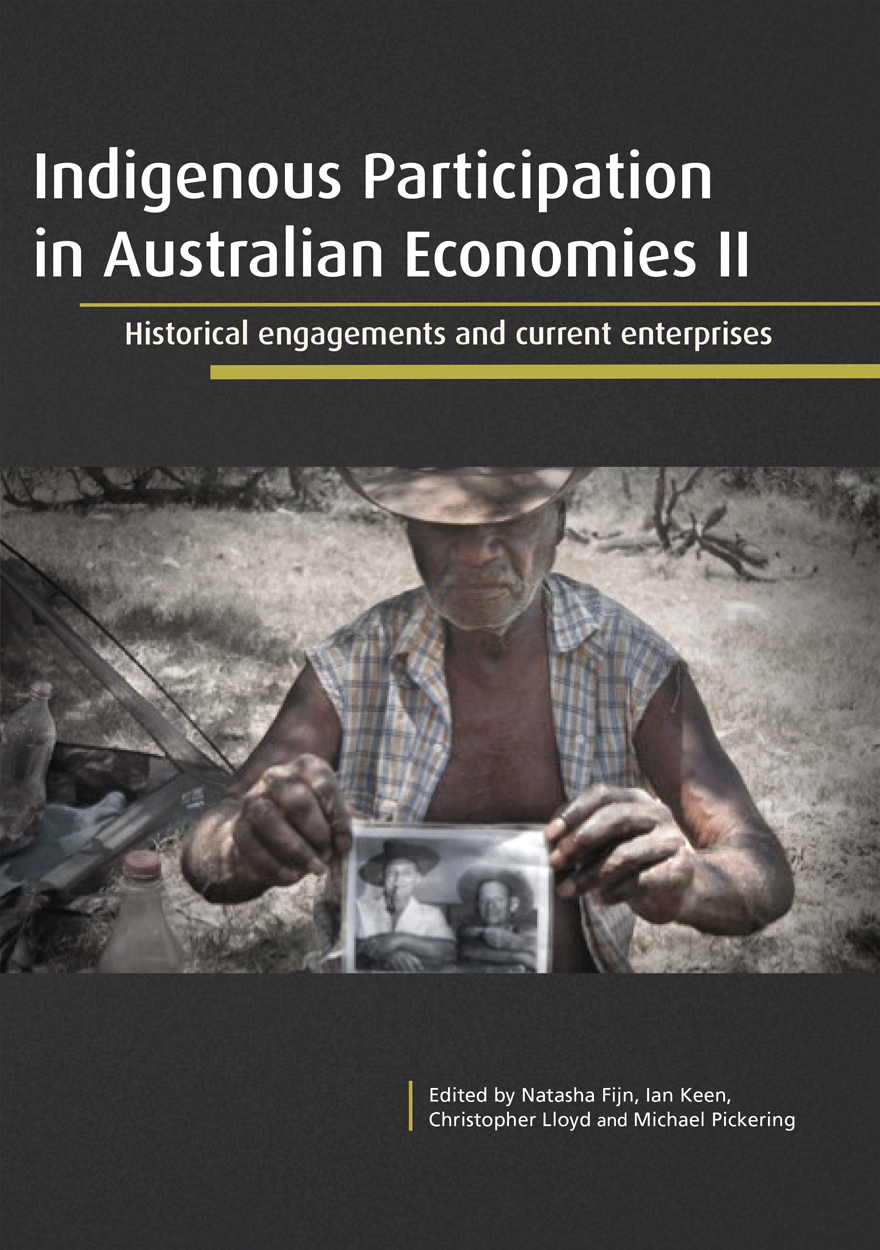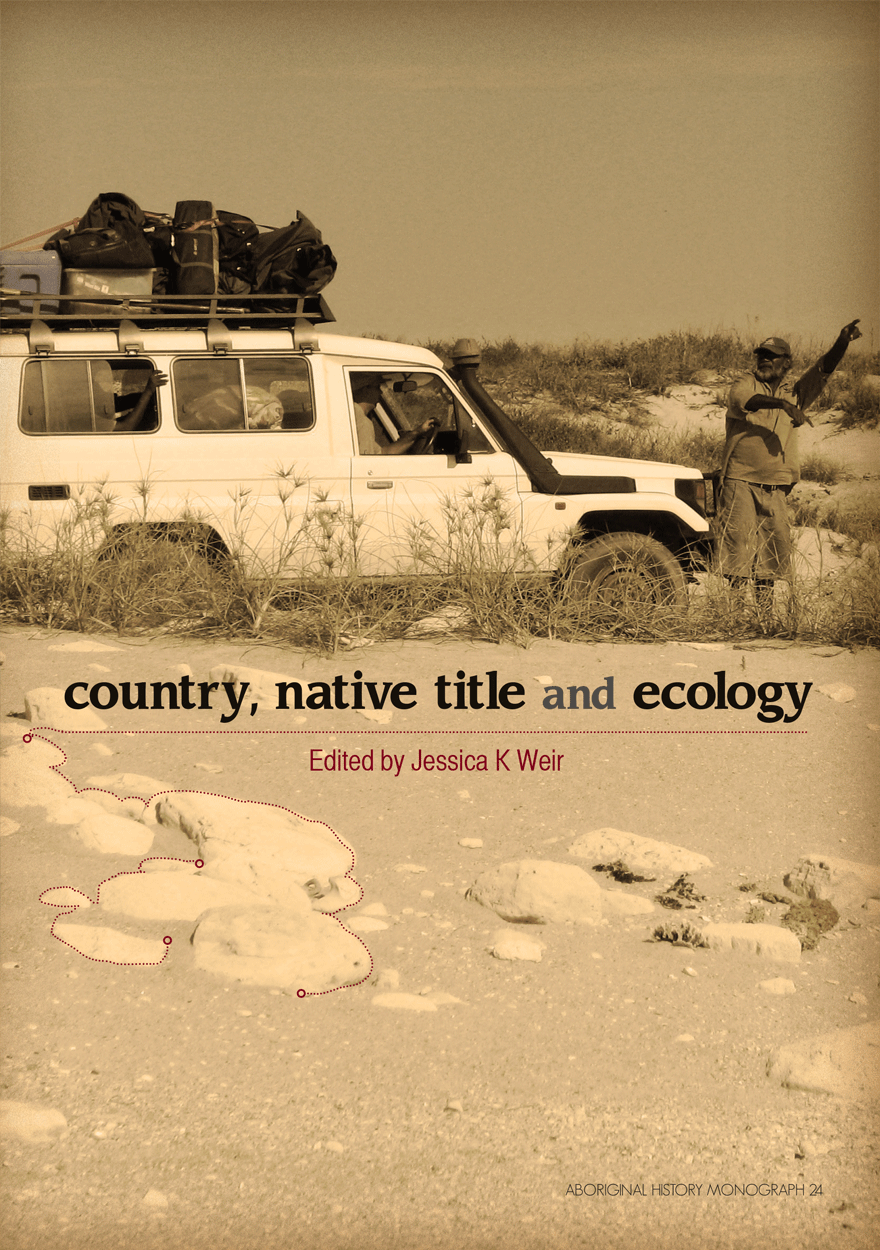Search titles
Displaying results 291 to 300 of 558.

Indigenous Participation in Australian Economies II »
Historical engagements and current enterprises
Publication date: July 2012
This is the second volume to emerge from a project on Indigenous participation in the Australian economy, funded by an Australian Research Council (ARC) Linkage Grant, and involving the cooperation of the School of Archaeology and Anthropology at The Australian National University and the National Museum of Australia. The Chief Investigators were Ian Keen, Chris Lloyd, Anthony Redmond, the Partner Investigator was Mike Pickering, Fiona Skyring was an associate researcher on the project, and Natasha Fijn was research assistant. The present volume arises out of a conference in Canberra on Indigenous Participation in Australian Economies at the National Museum of Australia on 9–10 November 2009, which attracted more than thirty presenters. The diverse themes included histories of economic relations, the role of camels and dingoes in Indigenous–settler relations, material culture and the economy, the economies of communities from missions and stations to fringe camps and towns, the transitions from payment-in-kind to wage economies and Community Development Employment Projects, the issue of unpaid and stolen wages, local enterprises, and conflicts over development. Sixteen of those papers have been developed as chapters in this volume, together with a foreword by Professor Jon Altman. This book comprises a companion volume to Indigenous Participation in Australian Economies: Historical and Anthropological Perspectives, published by ANU Press in 2010.

Public Sector Governance in Australia »
Authored by: Meredith Edwards, John Halligan, Bryan Horrigan, Geoffrey Nicoll
Publication date: July 2012
Australia lacks a scholarly book that covers recent developments in public sector governance in Australia and blends cross-disciplinary perspectives from law, management, public administration and public policy. The primary reason for writing this book is to fill the gap in the treatment of this subject, and to provide insights from empirical evidence and current practice.
The book provides the first comprehensive theoretical and empirical work on governance in the Commonwealth public sector. It addresses the issues that emerged under the Howard government as well as their handling under the Rudd and Gillard governments. The book aims to enhance understanding of and communication about public governance across government, industry and the community.
The authors bring to this book expertise gained from political science, public administration and policy, public and private sector law.

Agenda - A Journal of Policy Analysis and Reform: Volume 19, Number 1, 2012 »
Edited by: William Coleman
Publication date: July 2012
Agenda is a refereed, ECONLIT-indexed and RePEc-listed journal of the College of Business and Economics, The Australian National University. Launched in 1994, Agenda provides a forum for debate on public policy, mainly (but not exclusively) in Australia and New Zealand. It deals largely with economic issues but gives space to social and legal policy and also to the moral and philosophical foundations and implications of policy.
Subscribe to the Agenda Alerting service if you wish to be advised on forthcoming or new issues.
Download for free
Not available for purchase

Directions in Australian Electoral Reform »
Professionalism and Partisanship in Electoral Management
Authored by: Norm Kelly
Publication date: May 2012
Australia has a proud history of being an international leader in electoral administration, and Australian electoral commissions continue to have a professional, non-partisan approach to the management of elections. Yet their independence is constrained by the electoral laws they need to administer, and parliamentary committees charged with the oversight of the conduct of elections do so with a clear partisan bias.
Elections are all about winners, but who decides who the winners will be? Voters definitely have a big say, but it is the electoral system that determines how votes translate into seats in parliament. Any changes to the electoral system require the support of those in power, and it is important to question who benefits from electoral reforms. It is not surprising that partisanship plays a role and that governing parties usually benefit, although that is not always the case.
This book assesses Australian electoral reforms of the past 30 years using personal interview data and parliamentary debates, to provide a picture of the reform process as well as the outcomes. These issues, such as who gets to vote, the use of postal voting, party registration and vote weighting, have a profound impact on who wins elections. The book also examines Australia’s electoral administration, testing for professionalism, independence and integrity.

Rising China: Global Challenges and Opportunities (Chinese version) »
崛起的中国:全球机遇与挑战(预售)
Edited by: Jane Golley, Ligang Song
Publication date: May 2012
“中国经济前沿”丛书致力于对中国经济发展中的热点问题提供最新的研究成果与解读视角,作者均为国内外相关研究领域最具权威或居于研究前沿的学者。收录的论文无论在理论研究还是实证分析方面,都具有相当高的水准。本书集中于全球金融危机对中国的影响,分别从经济、地缘政治和环境气候变化视角解读世界和中国未来的发展走势。
Chinese print version of this book is available from Social Science and Academic Press

A Trial Separation »
Australia and the Decolonisation of Papua New Guinea
Authored by: Donald Denoon
Publication date: May 2012
When it came in September 1975, Papua New Guinea’s independence was marked by both anxiety and elation. In the euphoric aftermath, decolonisation was declared a triumph and immediate events seemed to justify that confidence. By the 1990s, however, events had taken a turn for the worse and there were doubts about the capacity of the State to function. Before independence, Papua New Guinea was an Australian Territory. Responsibility lay with a minister in Canberra and services were provided by Commonwealth agencies. In 1973, Prime Minister Gough Whitlam declared that independence should be achieved within two years. While Australians were united in their desire to decolonise, many Papua New Guineans were nervous of independence.
This superlative history presents the full story of the ‘trial separation’ of Australia and Papua New Guinea, concluding that — given the intertwined history, geography and economies of the two neighbours — the decolonisation project of ‘independence’ is still a work in progress.

East Asia Forum Quarterly: Volume 4, Number 2, 2012 »
Publication date: May 2012
East Asia Forum Quarterly grew out of East Asia Forum (EAF) online, which has developed a reputation for providing a platform for the best in Asian analysis, research and policy comment on the Asia Pacific region in world affairs. EAFQ aims to provide a further window onto research in the leading research institutes in Asia and to provide expert comment on current developments within the region. The East Asia Forum Quarterly, like East Asia Forum online, is an initiative of the East Asia Forum (EAF) and its host organisation, the East Asian Bureau of Economic Research (EABER) in the Crawford School of Economics and Government in the College of Asia & the Pacific at The Australian National University.
Download for free
Not available for purchase

Experiments in Modern Living »
Scientists’ Houses in Canberra 1950–1970
Authored by: Milton Cameron
Publication date: May 2012
When a group of brilliant young scientists arrived in Australia’s national capital after World War II to take up leading roles in the establishment of national research institutions, they commissioned Australia’s leading architects to design their private houses. The houses that resulted from these unique collaborations rejected previous architectural styles and wholeheartedly embraced modernist ideologies and aesthetics. The story of how these progressive clients contributed to the innovative design of their houses brings fresh insights to mid-twentieth-century Australian domestic architecture and to Canberra’s rich cultural history.

With the Benefit of Hindsight »
Valedictory Reflections from Departmental Secretaries, 2004–11
Publication date: April 2012
Secretaries of government departments in Australia are the bureaucratic leaders of their generation. They are ambitious, highly-talented executives who have risen to the very pinnacle of their chosen vocation – public service to the Australian nation – usually after having spent most, if not all, of their professional careers dedicated to the public service. They serve governments as their top advisers and in policy terms are often some of the most important decision-makers in the country.
This collection brings together the valedictory speeches and essays from a departing group of secretaries (and one or two other equivalent agency heads) who left the Australian Public Service between 2004 and 2011. Over this period of time it gradually became accepted that departing secretaries and heads of significant agencies would present a valedictory address to their peers at a public farewell function. The first two speeches in this collection were initiated informally and given at functions organised by their agencies; in 2005 the process was formalised with the Australian Public Service Commission acting as organiser.
These contributions contain reflections, commentaries, occasional fond memories or key turning-points in careers, critiques of changes that have occurred and an outline of the remaining challenges their successors will face as the public administrators of tomorrow.
From the outset it is clear that there is no uniform message, no single narrative levelled either in praise or in criticism, other than pride in the public service and strong belief in the contribution it makes to the Australian community. They have their own personal ‘takes’ on how the public service looks to them, on its performance and on the challenges confronting public administration into the future. Most spend some time looking back, reflecting on the extent of change that has occurred over the length of their careers; but equally importantly they look forward, anticipating future policy dilemmas and capacity challenges.

Country, Native Title and Ecology »
Edited by: Jessica K Weir
Publication date: March 2012
Country, native title and ecology all converge in this volume to describe the dynamic intercultural context of land and water management on Indigenous lands. Indigenous people’s relationships with country are discussed from various speaking positions, including identity and knowledge, the homelands debate, water planning, climate change and market environmentalism. The inter-disciplinary chapters range from an ethnographic description of living waters in the Great Sandy Desert, negotiating the eradication of yellow crazy ants in Arnhem Land, and legal analysis of native title rights in emerging carbon markets. A recurrent theme is the contentions over meaning, knowledge, and authority.
'Because this volume is scholarly, original and very timely it represents a key resource and reference work for land and sea managers; policy makers; scholars of the interface between post-native title responsibilities, NRM objectives and appropriate heritage protocols; and students based in the social sciences, natural sciences and humanities. It is rare for volumes to have this much cross-academy purchase and for this reason alone – it will have ongoing worth and value as a seminal collection.'
– Associate Professor Peter Veth, ANU College of Arts and Social Sciences, The Australian National University.



